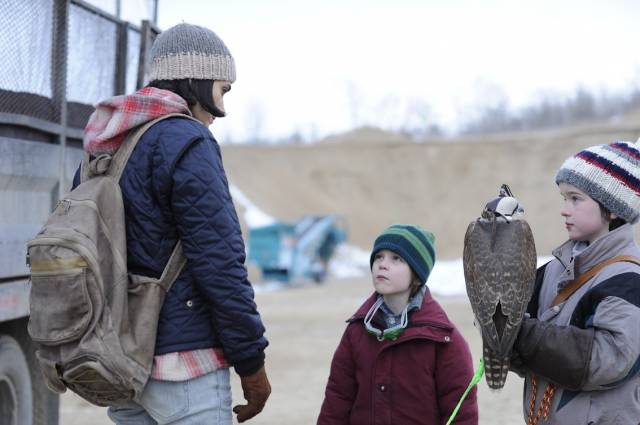
 Peruvian filmmaker Claudia Llosa makes her English language debut with Aloft, a curious mixture of falconry and faith healing. Featuring an impressive cast including Jennifer Connelly, Cillian Murphy, and Melanie Laurent, Aloft features strong performances and is adept at generating a powerfull mood, but its near total lack of narrative cohesion will alienate many audiences and undermines the ideas Llosa tries to explore (though those ideas might not hold up to closer scrutiny anyway).
Peruvian filmmaker Claudia Llosa makes her English language debut with Aloft, a curious mixture of falconry and faith healing. Featuring an impressive cast including Jennifer Connelly, Cillian Murphy, and Melanie Laurent, Aloft features strong performances and is adept at generating a powerfull mood, but its near total lack of narrative cohesion will alienate many audiences and undermines the ideas Llosa tries to explore (though those ideas might not hold up to closer scrutiny anyway).
Aloft shows two stories in parallel: in the first, Nana (Connelly) struggles to care for her two children, Ivan (Zen McGrath) and Gully (Winta McGrath), the younger of whom is terminally ill, taking him to a mystical faith healer. The excursion ends in a small tragedy and sets in motion events that will end in a greater tragedy and Nana’s recognition that she too might have healing powers. The other story takes place about 20 years later, when a documentary filmmaker (Laurent) finds an adult Ivan (Murphy), whose childhood hobby of falconry has become a profession, and convinces him to accompany her in finding his estranged mother. The film has such a tight focus on the immediate action that we never completely learn what type of world this takes place in – apparently miracles are possible, there are no indicators of any kind of state or authority, and all the characters seem to struggle to get by in a hardscrabble subsistence economy, except for the documentarian. Audiences are willing to accept the impossible, but a film becomes incoherent if certain boundaries are not made clear, and nothing in Aloft is made remotely clear.
Like many films that tell the story of the same characters at different times in their lives, Aloft suffers from the sense that the characters have mostly spent the intervening years suspended in amber, not growing or letting go of the past at all until the cameras start rolling again. That being said, the actors make the most of what they’re given. Connelly is particularly good, portraying a mother who must be relentlessly practical until she hears a higher calling that she must pay a price for. Murphy possesses a strength, even when playing an irredeemably wounded man and while Laurent is mainly in an observational role, a third act twist for her character feels earned by her sense of gravity. With the community that arises surrounding Nana, Llosa seems to equate creating art with healing, an interesting idea that’s only viewed in glances and not satisfactorily explored, despite being at the center of the story.
Regardless of the plot’s failings, many other elements of the film work well. Alternating from jittery handheld close-ups to sweeping wide shots, the visuals are undeniably stirring, especially the beautiful shots of falcons in flight and lingering shots suggesting a mystical sense of unexplored possibility in the barren Arctic wastes. This imagery works in tandem with a strong score to elicit a feeling of spiritual searching that the characters seem to share, if never quite articulate. Aloft will appeal to viewers who prefer mysticism and sensory wonderment to logic and plot, but will leave others scratching their heads. Llosa is in many respects a talented director, but one hopes she can find a more disciplined screenwriter to work with in the future.